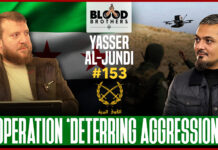
US airstrikes against the “Islamic State” in Iraq is another fine example of America’s double standards when it comes to “fighting terrorism” and humanitarian intervention, writes Dilly Hussain.
The U.S. carried out targeted airstrikes against the Islamic State (also known as ISIS) in Iraq over the weekend, under the guise of ‘humanitarian intervention’. According to Barack Obama it was a “necessary” intervention, “When we have the unique capabilities to help avert a massacre, then I believe the United States of America cannot turn a blind eye.” The “massacre” which Obama is referring to is the persecution of the Yazidis, a mysterious indigenous Kurdish minority who have historically lived in north west Iraq.
ISIS demanded jizya (tax for non-Muslims under an Islamic state) from the Yazidis, who refused to pay, and as a result, were forced to retreat to Mount Sinjar in western Mosul. Some media outlets are stating the number of Yazidis stranded in the mountains without food and water is 50,000, whilst others have stated no more than 5,000. All of this, unfortunately, is not the crux of my article.
Selective humanitarian intervention
The issue I want to raise is why the U.S. has decided to intervene now? Whilst I’m totally against any western military intervention in the Muslim world, one can’t help but question the thought process of foreign policy makers in Washington. More than 200,000 Syrians have died and millions of refugees are displaced in neighbouring countries. 1,800 deaths in Gaza, thousands injured, their homes in rubble, and there wasn’t even a fart from Washington in the right direction, let alone a mentioning of ‘humanitarian intervention’ against Israel – but that’s a separate discussion in itself.

It is not ethically correct to compare the death toll, duration of occupation or level of oppression between different conflicts – the killing of innocent civilians regardless of race or religion can never be justified. However, a quick glance at the U.S.’ deafening silence over the humanitarian crisis in Syria and the recent Israeli onslaught on Gaza in contrast to its hastening in being the saviour of the Yazidis, is highly suspicious.
The Kurds have been loyal U.S. allies since the invasion of Iraq in 2003. They have received weapons, financial support and its militia-turned-army, the Peshmerga were trained by the U.S. for assisting in the removal of Saddam Hussain. It’s also no secret that the administration of G.W.Bush had plans to divide Iraq into three small states based on ethno-religious lines – an independent Kurdistan, a Sunni Arab and Shia Arab state. Many analysts have argued that this plan is already underway with ISIS controlling Mosul, Fallujah and surrounding Sunni majority areas, the Kurds with their autonomous state in the north, and the Shia-led government of Prime Minister Nuri al-Maliki ruling Baghdad and the south of Iraq.
Subscribe to our newsletter and stay updated on the latest news and updates from around the Muslim world!
Oil
I doubt it was Obama’s sense of humanity that led him to authorise the airstrikes against ISIS. In reality, it all boils down to oil. The capital city of Kurdistan, Erbil holds 25% of Iraq’s oil reserves, and its stability is the nucleus of America’s political and economic interests in Iraq. As President Obama pointed out, “The Kurdish region is functional in the way we would like to see.” So whilst the U.S. delivers humanitarian aid to the Yazidis and works tirelessly to prevent Islamic extremists from expanding their ‘caliphate’, in reality what’s really going through the mind of the Obama administration is the numerous oil and gas companies drilling away in Kurdistan. With giants like Exxon Mobil and Chevron in the equation, ISIS poses a direct threat to contractors, oilfield service companies, accountants, construction and trucking firms.
Bush used weapons of mass destruction, Saddam harbouring Al Qaeda, the need for “regime change” and democracy when invading Iraq in 2003; and like his predecessor, Obama has used the ‘Yazidi genocide’ and the prevention of ISIS expansion for ‘humanitarian intervention’ – when in actuality, it’s all about oil and geopolitics. The irony is that Obama had absolutely no problem with ISIS wreaking havoc in Syria, fighting other rebel factions and single handily stalling the push towards Damascus. The U.S. hardly flinched when ISIS took Mosul, Fallujah and other Sunni areas in Iraq – it only moved when its interests were directly under threat, as any imperial neo-colonial superpower would do.

Some within the Muslim community in the West and the Arab world have not learnt the lessons from Afghanistan (2001), Iraq (2003) and Libya (2011). It’s as if Muslims are incapable of dealing with their own problems without calling to America to ‘liberate’ them, to later regret it when entire cities are bombed to smithereens. Do not misconstrue my questioning of U.S. inaction in Syria and Gaza as an invitation to military intervention, God no! I highlighted these issues earlier in the article to illustrate the hypocrisy and double standards of the U.S when its wars are justified under humanitarian intervention and fighting terrorism.
As well as protecting its economic interests in Iraq and preserving its political ally in Kurdistan, the U.S. is now drawing a red line to let ISIS know where it can and cannot flex its muscle. Time will tell whether ISIS will stay within its remit and avoid picking an uphill battle of self-destruction by threatening American interests in Kurdistan. And if ISIS does stay within its limit, will this represent the beginning of the U.S.’ initial plan to carve Iraq into three ethno-religious states, hence ‘allowing’ ISIS to gain lands currently under its control? Will the old colonial strategy of divide and rule further destabilise an already volatile region, which is yet to find its feet from what was once known as the Arab Spring?
@DillyHussain88
This article was first published in the Huffington Post website.





















